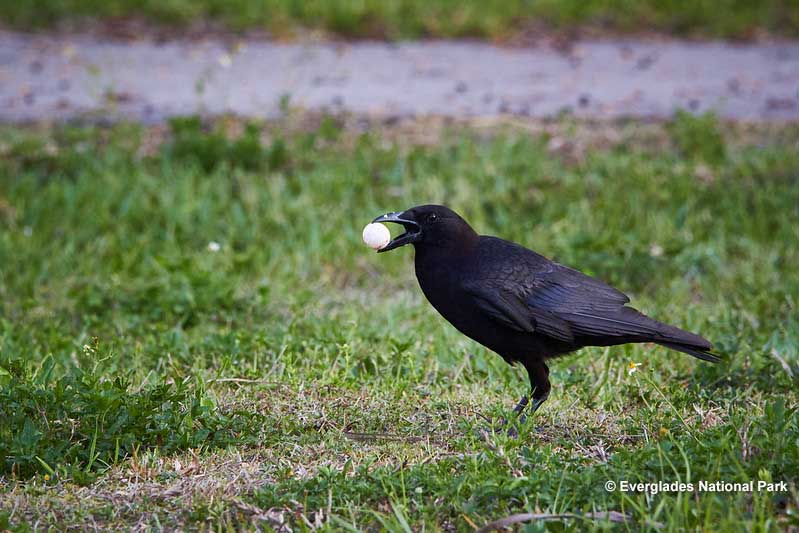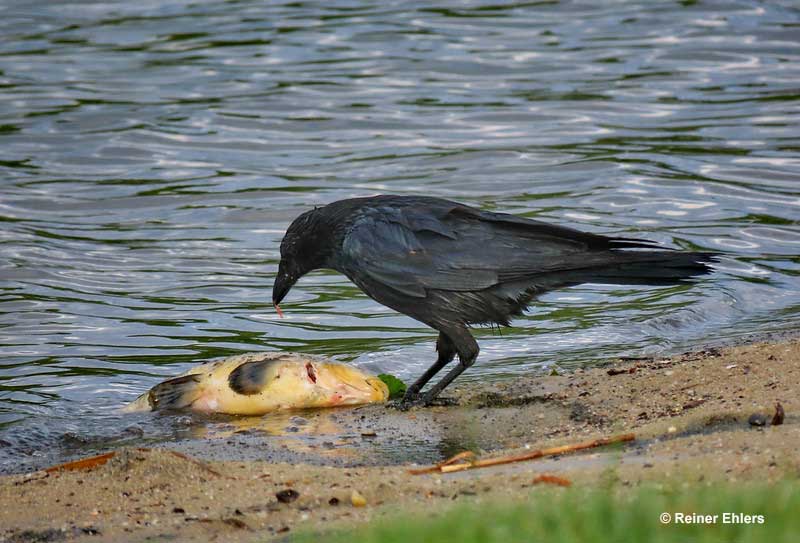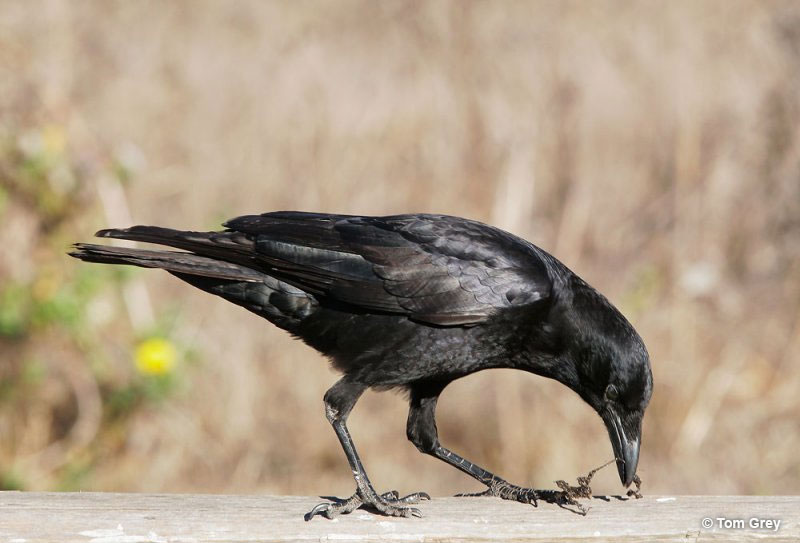
Crows are hard to ignore! I hear the loud calls of these common and conspicuous birds in woodlands, farm fields, and even cities.
These birds are so smart, they thrive in all sorts of places. To survive in different habitats, crows also need to have a diverse and adaptable diet.
What exactly do crows eat? How do they find food in places as different as wild forests and urban parks?
See this article for answers and to learn more about the diets of crows!
Key takeaways:
- The diet of crows largely depends on what’s available.
- When the opportunity presents, crows can go for bird eggs, and even birds.
- However, crows do present some benefits – they help control insects and keep the surrounding areas clean.
What Do Crows Eat?
Crows are omnivores that eat a wide variety of items. In general, they eat whatever they can find, and their diets are associated with where they live.
They aren’t picky and take advantage of a wide variety of feeding situations. For example, I have seen American Crows stand on a flooded lawn to eat dozens of earthworms, visit garbage dumps, and eat grain in farm fields.
These birds can forage on their own, in small groups, or in large flocks. Although crows sometimes perch in fruiting trees to eat cherries and other small fruits, they usually forage on the ground.
Crows like to walk on lawns, open fields, and at the edge of lakes and other wetlands to look for food. As they move along, they use their beaks to dig in the ground and turn over bits of dirt to search for insects and other small creatures.
They also pick corn and seeds from the ground, dig for clams, and even wade into shallow water and catch small fish!
American Crows are also quite predatory and take eggs and nestlings from the nests of all sorts of birds. They also routinely kill mice and other small rodents and occasionally catch small birds in flight!
Seeds & Nuts
American Crows eat a variety of nuts and seeds. As with other aspects of their diet, the ones they eat the most depend on what’s available. In some places, these birds eat pistachios, and in other areas, they feed on pecans and almonds.
Related: What do birds eat?
Crows can also descend to roads to eat walnuts that have been cracked open by passing cars.
This versatile bird frequently visits farm fields to feed on spilled corn, barley, and other grains while also foraging for insects and other types of food. Some of the other seeds they feed on include pumpkin seeds as well as various seeds from wild plant species.
Fruit and Vegetables
American Crows like to eat fruit and vegetables, too. They eat a lot of berries, especially berries from the Dogwood trees, Nightshade and Poison Ivy plants, and Sumacs, among other plant species. Chokecherries and watermelons are commonly eaten by crows, and they can also eat grapes, raisins, and other fruits.
These omnivorous birds eat vegetables when the opportunity presents itself, although not as much as some other types of food. American Crows can dig sedge tubers out of the ground, and they also occasionally eat tomatoes, peppers, lettuce, and other garden crops.
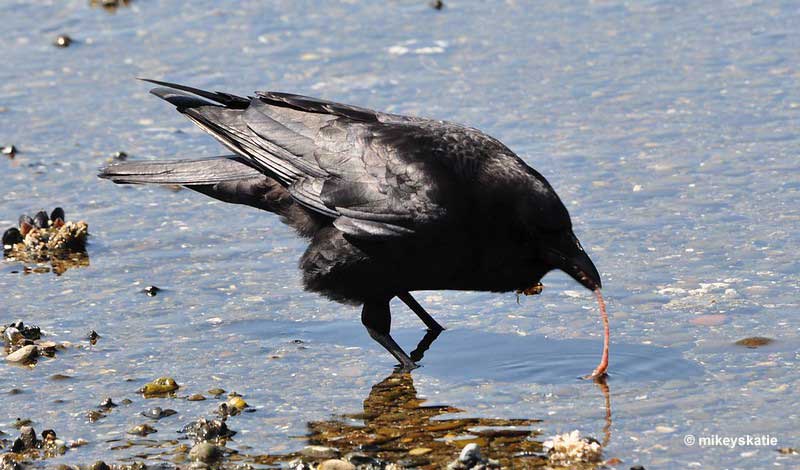
Crows eat all kinds of insects and bugs. © mikeyskatie
Insects
Crows eat a wide variety of insects, including crickets, grasshoppers, beetles, and larvae among species. In general, they don’t seem to have much of a preference but catch whatever insects they can find.
As crows forage on the ground for grain and other items, they also keep an eye out for insects. They pick up grubs and other bugs from the ground and from beneath rocks, sticks, and bits of dirt. These adaptable birds can also pick some insects from vegetation.
Since crows eat so many insects, they certainly help farmers and gardeners. Some of the pests they feed on include corn borers and Gypsy Moths.
Fish & Mollusks
Crows like fish, too! Crows that live around wetlands and in coastal areas often catch small fish. They wait at the edge of the water or wade into very shallow water and snatch minnows, Gizzard Shad, and other small fish with their beaks.
Small fish are an especially important part of the diet of crows that occur on the Pacific coast. These “Northwestern Crows” like to forage in tidal pools for Pricklebacks and other tiny fish that occur there. These and other coastal crows also feed on small mollusks, including clams that they dig out of the sand.
Animals (Alive & Dead)
Crows take advantage of this food source from time to time, especially during the winter months. They can watch and follow Turkey Vultures to food, keep an eye out for roadkill, or visit garbage dumps.
Coastal crows also patrol beaches in search of dead fish. While foraging for carrion, crows also hunt for small animals.
They usually catch mice, voles, and other small rodents as the opportunity presents itself, maybe more so during the winter months.
For example, if they happen to chance upon a small mouse in the open or other vulnerable situation, a crow will be quick to pounce on the animal.
Birds & Bird Eggs
As with other members of the Corvid family, crows are important nest predators. They commonly attack nests of smaller birds to eat the eggs and nestlings.
Crows will go after any small nest they see and can also raid waterbird nests. Since other birds recognize them as predators, they may harass the crow and try to drive it away.
If the crow is harassed too much, it might leave the area and look for an easier target. However, if it finds a nest, the crow can take one egg at a time until it has gotten all of them.
Are Crows Good To Have Around?
Crows are common birds, but a lot of people find them noisy and annoying. I appreciate crows, but I can’t blame those folks. After all, the big black birds aren’t as easy on the eye as a Northern Cardinal and they are pretty vocal!
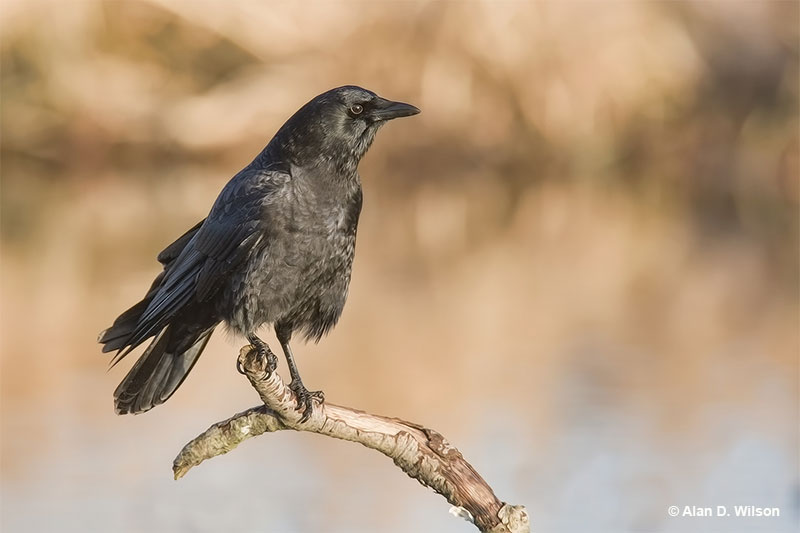
In some farming areas, crows can also be a cause of crop damage. They can pick sprouting peanuts, damage corn, and peck into watermelons. However, the amount of damage crows do usually isn’t as much as the damage caused by large flocks of blackbirds.
American Crows may damage some crops, but the birds are also beneficial, especially when they act as valuable natural pest control.
Crows are important predators of Corn Borers and many other crop pests. The birds are excellent at removing these and other pests, including Gypsy Moths.
Related: How to befriend crows?
Crows also help us by feeding on carrion. They and other scavengers help remove dead animals that might otherwise spread disease.
Another good reason to have crows around is to simply watch them. Crows are highly intelligent and fascinating birds. What they lack in colors, these birds make up for with interesting and entertaining behaviors. Watch crows as they communicate and play with each other, and you’ll be surprised at what you see!
Frequently Asked Questions
What is the favorite food of crows?
The favorite food of crows is just about anything they can find. However, they love to eat corn, peanuts (unsalted), mealworms, and insects.
What should you not feed crows?
You should not feed crows salted foods, junk food, bread, or chocolate.
What do you feed crows to make friends?
To make friends with a crow, you can feed them unsalted peanuts, mealworms, and cracked walnuts.
What are crows most attracted to?
Crows are most attracted to corn and other grain, bits of meat, and mealworms.
Do crows remember who feeds them?
Yes, crows remember who feeds them. They are highly intelligent birds!


